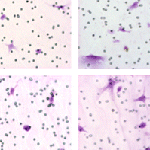Growth factor purification and delivery systems (PADS) for therapeutic angiogenesis
Main Article Content
Abstract
Background
Therapeutic angiogenesis with vascular endothelial growth factor (VEGF), delivered either via recombinant protein infusion or via gene therapy, has shown promise in preclinical models of various diseases including myocardial infarction, renovascular disease, preeclampsia, and neurodegenerative disorders. However, dosing, duration of expression, and tissue specificity are challenges to VEGF gene therapy, and recombinant VEGF delivery suffers from extremely rapid plasma clearance, necessitating continuous infusion and/or direct injection at the site of interest.Methods
Here we describe a novel growth factor purification and delivery system (PADS) generated by fusion of VEGF 121to a protein polymer based on Elastin-like Polypeptide (ELP). ELP is a thermally responsive biopolymer derived from a five amino acid repeat sequence found in human tropoelastin. VEGFPADS were constructed by fusion of the ELP coding sequence in-frame with the VEGF 121coding sequence connected by a flexible di-glycine linker. In vitroactivity of VEGFPADS was determined using cell proliferation, tube formation, and migration assays with vascular endothelial cells. Pharmacokinetics and biodistribution of VEGFPADSin vivowere compared to free VEGF in mice using quantitative fluorescence techniques.
Results
ELP fusion allowed for recombinant expression and simple, non-chromatographic purification of the ELP-VEGF 121chimera in yields as high as 90 mg/L of culture and at very high purity. ELP fusion had no effect on the VEGF activity, as the VEGFPADS were equally potent as free VEGF 121in stimulating HUVEC proliferation, tube formation, and migration. Additionally, the VEGFPADS had a molecular weight five-fold larger than free VEGF 121, which lead to slower plasma clearance and an altered biodistribution after systemic deliveryin vivo.
Conclusion
PADS represent a new method of both purification and in vivostabilization of recombinant growth factors. The use of this system could permit recombinant growth factors to become viable options for therapeutic angiogenesis in a number of disease models.

